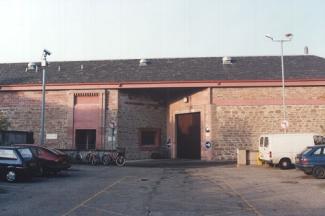The present prison was opened in 1902, having relocated from nearby Inverness Castle to what was, at that time, the rural parish of Porterfield.
There were 25 male and 10 female offenders in accommodation comprising of 49 cells. Throughout its subsequent history the prison has had a mixed population of men and women, convicted and untried offenders.
The accommodation halls within the confines of the original wall have changed internally over the past 100 years, although their facades have remained the same. A number of extensions and extra buildings have been incrementally added to cope with rising and changing demands. Examples include the new Gate complex, the workshops and laundry. Other areas, such as facilities for healthcare and catering have been modernised.
The original cells were barely furnished. Now they have in-cell sanitation, bunk-beds, fitments, electric power and TVs - reflecting modern standards of living.
Prison labour was used to build the establishment. Subsequent employment included oakum-picking, sack sewing and mat-making, as well as maintenance of the prison estate and further building work. Physical drills and Bible classes punctuated the week. There is no mention in the records of 1903 of learning centres nor fitness centres such as those provided today. Programmes to address offending behaviour did not feature either, although perhaps the Chaplain (who "states that he spends upwards of 2 hours weekly in the prison") and Mrs Werner, the "Lady Visitor" took such a role upon themselves.
The working environment for staff has also changed. The first Governor, John Nicol, had a house built for himself within the walls. Two houses were additionally erected for "married warders" and "female warders" had quarters provided too - supplied with drainage, gas, water and service pipes. Prison Officers now work an average of 37 hours a week and the concept of tied housing has been abandoned since the 1980s. Their job has evolved away from that of turnkey to actively engaging with prisoners in pursuit of the Scottish Prison Service model of correctional excellence.

